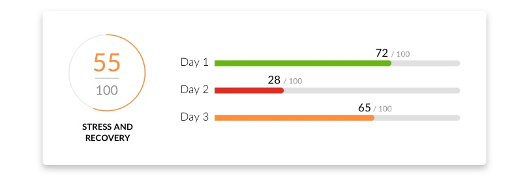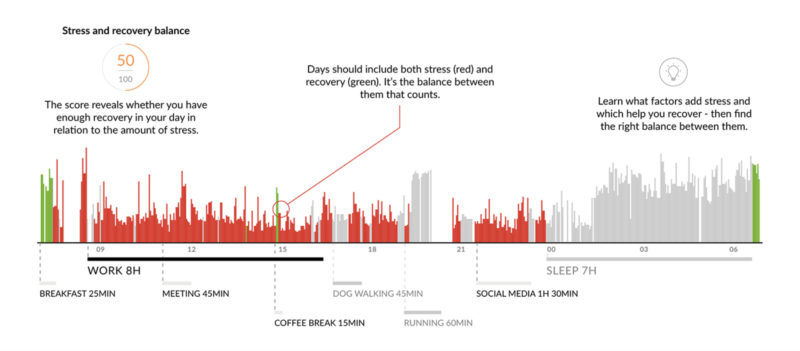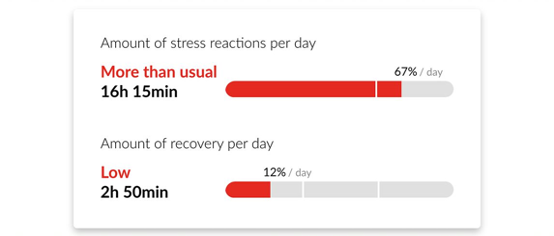
Stress has a negative connotation but, in reality, it’s not dangerous and you don’t need to avoid it. The important thing is making sure it is in proportion to your recovery.
It’s all about balance. Do you recover enough compared to the amount of stress you experience? Of course, that’s not always easy to recognize. Firstbeat Life helps you see – and monitor – the balance between stress and recovery in your body as you go about your daily life.

The Firstbeat Life app shows your stress and recovery balance for each day.
We Need Stress…
Stress simply means an elevated activation level, during which the autonomic nervous system’s sympathetic branch (often called the body’s gas pedal) is active.
Stress is actually a normal, everyday reaction that improves performance as long as it’s not excessive. But stress does consume your body’s energy reserves and resources, so you need to recover from it to avoid problems caused by long-term excessive stress such as exhaustion or chronic illness.
…and Recovery Too
Recovery is the opposite of stress. The autonomic nervous system’s parasympathetic branch (the body’s brake pedal) is engaged, causing your activation level to drop and resources to be replenished. Moments of recovery allow the body’s balance, or homeostasis, to be restored. The stronger the stress reactions, the more recovery time your body needs.
Firstbeat Life makes it easy to see when and how much stress and recovery you experience in your day, and if they were suitably balanced. Stress is shown in red in the daily graphs while recovery is presented as green.

A Firstbeat Life graph where the stress and recovery balance is moderate (a score of 50). Better balance can be achieved by increasing the amount of sleep, slowing down before bedtime, and adding some short recovery moments into the day.
Ultimately, to unlock your health and performance potential, you need both stress and recovery. Finding their optimal balance makes the difference. During the day, an appropriate amount of stress helps you get the job done, but to maintain performance in the long run, stress should be broken up by short recovery periods that give your brain and muscles a break. During the workday, this could mean short microbreaks at regular intervals and eating or drinking something every 3-4 hours to maintain healthy blood sugar and hydration levels.
Without Adequate Recovery, Your Battery Starts to Drain
During leisure time, stress and recovery balance can be maintained by doing something enjoyable and meaningful because a positive frame of mind promotes recovery. However, it’s good to remember not to overdo it, since you need to recover from the positive stress you experience as well.
The most important time for recovery is a sufficiently long, restorative sleep period. It has the biggest impact on the total amount of recovery and the stress and recovery balance score.

The Firstbeat Life app shows how many minutes of recovery and stress reactions you had in a 24-hour period. If it is unbalanced in favor of stress, the bars show up as red.
If your workdays are long and your recovery tends to get worse as the week progresses, you can improve the situation by sufficient rest during your days off – taking time to relax and recharge your body’s battery.
If the balance remains negative for too long, excessive stress starts to cause problems and the body’s defense system is weakened. Even long sleep periods might not be enough to activate a recovery response and the Firstbeat graph stays red. When your body is constantly “on” even stepping on the brakes does not help. If you neglect the alarm signals your body is sending you it could lead to some more serious health problems.
Regular measurements help you to see when the amount of stress is starting to build up and what kinds of actions support good recovery. The aim is not to eliminate stress but to find the optimal balance between work and leisure, and between load and rest.
Balance stress and recovery for better health. Firstbeat Life helps you discover what’s right for you and how to improve your physical and mental well-being, one small change at a time.
You might also be interested in

Is Your Sleep Restorative Enough?
Sleep and recovery are not the same thing. You can sleep eight hours a night without having any physiological recovery. The key is getting enough good quality sleep. Firstbeat Life…

Avoid Boreout and Burnout and Find Your Optimal Zone
Boreout can impact you physically and mentally. Learn to find your optimal zone.

